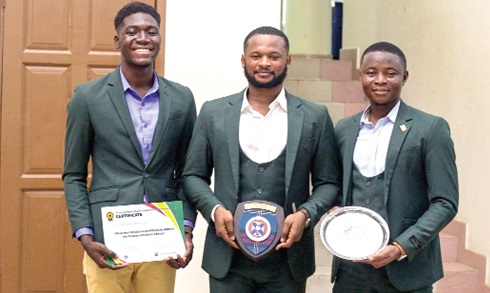
UDS wins maiden independence debate
A team from the University for Development Studies (UDS) has emerged winners of the maiden edition of the Advanced Higher Education National Independence Debate.
The team, which comprised Mahadi Awedaga Ayiwoli, Kassim Fusheini Maltiti and Dewilaa Luther Fembeti, managed to beat a team from the Kwame Nkrumah University of Science and Technology (KNUST) after securing 122 points during the final round of the competition.
They were presented with a plaque, items from the University of Edinburg, certificate and a book voucher.
The team from KNUST who took the second position, scored 116 points and were also presented with certificates and a plaque.
The debate drew speakers from the country’s top tertiary institutions, along with eminent panel of judges, to articulate the youth perspective on the intersection of decolonialisation, climate change and sustainable development.
The debaters from UDS, KNUST, University of Ghana (UG) and the University of Cape Coast (UCC) argued on the topic “Africa must decolonise to effectively address the scourge of climate change.”
After the first round, UG and the UCC were booted out of the competition after failing to secure the pass mark to enter the second round.
Climate change
The debate, which was organised by the UG in collaboration with the University of Edinburg, was to enable the voice of the African youth to be heard on some of the pressing global issues of climate change and decolonisation.
The approach of engaging the youth on critical discussions aligns with Edinburg’s commitment to fostering a new generation of leaders who are well connected, well informed and actively involved in shaping the future.
The Academic Lead for the Edinburg/ African Partnership, Dr Nelson Oppong, said the debate was motivated by the fact that climate change was a big problem and Africa was already witnessing some of its devastating impact.
Throughout the world, he said the youth were getting at the frontline of the climate fight, however, Africa’s presence in the fight was low.
